Alistair Donohoe is living the dream
Alistair Donohoe had always dreamed of being an elite sportsperson. It’s a dream the World Champion and Paralympic silver medallist lives every day. Inform caught up Alistair to talk about the injury that nearly derailed his dream, his many career highlights and why there’s still plenty more he wants to achieve.
No plan b required
Alistair Donohoe has never had a plan b. After multiple world championships and Paralympic medals though, it’s clear the twenty-five-year-old doesn’t need one.
Today, Donohue is a professional cyclist spending his weeks riding hundreds of kilometres and putting in hours at the gym training for his next race. But eleven years ago, he was an active 14-year-old living with his family in Darwin, dabbling in everything from gymnastics to triathlons.
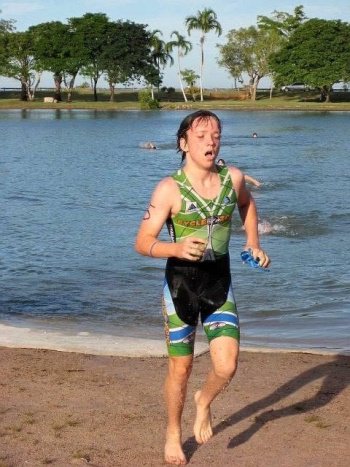
Alistair Donohoe started competing in triathlons to keep fit. Image: supplied.
‘I did triathlon with my parents. They got into that just to keep fit, and I ended up just kind of following suit with them. And then I actually really enjoyed kid’s triathlon. And then more specifically really enjoyed the bike aspect,’ Donohue told Inform from his Sunshine Coast training base.
At the tender age of 12, Donohue shifted his focus from triathlon to cycling. At the beginning, he did all kinds of cycling from BMX and mountain biking to road and velodrome. But a move to Melbourne to complete high school saw him focus on road and velodrome.
‘The competition in Melbourne is far tougher and there’s far more to do. So, I got into the road and velodrome aspect when I was there. And yeah, the rest is kind of history.’
More to Alistair Donohoe’s story
But there’s far more to Donohoe’s story that just that. At 14, while swimming at a local creek in Darwin with friends, Donohoe jumped out of a tree, like he’d done plenty of times before. But this time, he got tangled in the rope.
‘The damage caused from going from falling to a complete stop on the rope severed through 90 per cent of my tricep and 80 per cent my bicep.
Donohoe says that while many people ask him how he dealt with such an injury at such a young age, he says he was focussed on being a teenager, spending time with his friends and doing what he normally did.
‘I have a vivid memory of being in a wrist brace with a massive swollen arm and going to the local Wednesday night running club with my parents, and just running with my arm across my chest, strapped to my chest.’
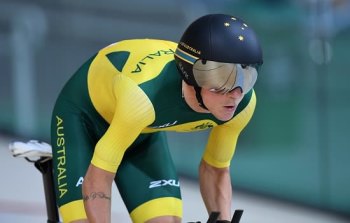
Alistair Donohoe won silver in the men’s C5 4000m Individual Pursuit. Image: Paralympics Australia.
After months of occupational therapy and burns treatment, Donohoe says the swelling went down and movement in his wrist slowly began to return.
‘Now it looks like I’ve had a shark take a bite out of my tricep.
‘I was a bit sensitive with my arm in terms of like its cosmetic appearance and what people might have thought about it. And I didn’t really like to wear singlets because my arm looked funny. By the time I was 18 I was over that.
‘People often ask, how did you deal with it? And I’m like, well, I didn’t do anything different. I think I’ve been pretty blessed in life to have that sort of mentality that when a little bit of adversity comes my way I don’t actually end up thinking about it too much, I just kind of have an innate ability to get on with it.’
Overcoming adversity
That kind of thinking and the ability to overcome adversity is certainly a handy attribute to have when you’re a professional athlete. After more than seven years riding professionally, Donohoe has collected an impressive number of highlights. He won two silver medals at the Rio Paralympics, in the individual pursuit and the road time trial. He’s also a World Champion eight times over.
‘I don’t want to sound at all blasé, but I’ve won eight World Championships, so you can’t sit there and list eight World Championships as the highlight but I think for me the first one I won was definitely like a massive relief, well not relief, it was ecstatic.
‘I’d finally made it to the top step. And that was definitely a highlight.
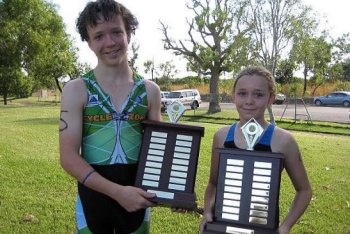
Alistair Donohoe started competing in triathlons to keep fit but he soon shifted his focus to cycling. Image: supplied.
‘But I think that actually one of the bigger highlights came the next year, being the defending champion, going into it and having a real target on your back. I won in 2015 again and that, for me, I just felt so much internal pressure going in, being defending champ and you know, tough course and I really, really wanted it and I think to win once is a great achievement because it takes a lot to win but… to win twice really kind of put a stamp on it.
‘Rio Paralympics is another highlight. I had two really good races to win silver twice. I had one unfortunate race but that just added fuel to fire.’
The unfortunate race Donohoe speaks of was the road race at Rio where he was ridden into the wall and missed out on what was a likely gold medal.
Powering on to the Paralympics
While the postponing of the Tokyo Paralympics will push back Donohoe’s pursuit of a gold medal it’s not changing his training schedule. He started his preparation in October last year and doesn’t plan to take a breather.
‘The fact that the games are postponed now, I’m not upset with that because that gives me an extra year to improve as a cyclist and to work on the goals that I want to work on. Because cycling is a compounding sport, the more training you do the better you get so in years’ time, I’ll be a year better than I am right now.
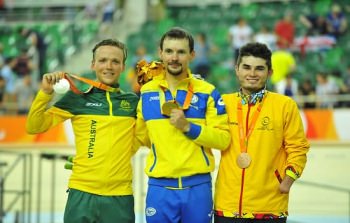
Alistair Donohoe has won eight World Championships but there’s still plenty he wants to achieve, including a gold medal. Image: Paralympics Australia.
‘Going into the preparation of it is, is like a rabbit hole of everything. We’ve been working on aerodynamics a lot, we’ve been working on my physiology, trying to address what are the demands for the results that I want and setting personal goals and being like alright, if this is the time that we want to ride at the Paralympics then what do you have to do?
Thriving on the challenge
It’s a more complex preparation for Donohoe because of the two very different types of events he races in at the Paralympics.
‘I’m training for a four-and-a-half-minute event in the first week of games, and then a two hour event in the last week of the games, so that’s the challenge of Tokyo because each World Championships I go to, I get to specialise and focus on the event that I’m competing in at that World Championships and the demands of that event, whereas Tokyo, a good analogy is I have to be a good 800 metre runner and a good marathon runner.
‘One, you have to be really big, really powerful, really explosive and the other, you have to be able to go really hard for 100 kilometres. So one’s completely endurance and one’s completely anaerobic.’
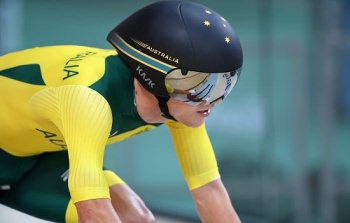
Alistair Donohoe competes in sprint and endurance events. It’s a challenge but one the cyclist thrives on. Image: Paralympics Australia.
It’s a challenge but it’s one Donohoe thrives on.
‘I really like thinking about the approaches and addressing the training and figuring out the puzzle. And then seeing the differences.’
For now, Donohoe will continue with his training, spending between 25 and 30 hours a week in the gym and on his bike. He’ll ride anywhere from 650 to 800 kilometres in a week, breaking up the kilometres of road with some riding on dirt roads and mountain biking to keep himself mentally fresh.
Donohoe still has plenty more to achieve
Despite his impressive list of achievements, Donohoe still has plenty he wants to achieve, with a Paralympic gold medal at the top of the list.
‘That’s something I should have won and didn’t win and that’s a real redemption point for me. It’s unfulfilled. And I can’t wait to be given the opportunity to go back and achieve that goal.
‘Not saying that it’s going to come at Tokyo, hopefully it does, but there’s always a chance it doesn’t so if it doesn’t, I’ll just look towards Paris. But I would like to think that I don’t stop until I get that gold. And then I mean, the world of professional cycling is so vast.
‘The sky’s the limit there. There’s always competitions and events and different levels that you can get to. But I just love cycling.
‘So, it’s not about what level of competition I get to or tick off. It’s about racing my bike and I think that’s something I’ll do hopefully, for many, many more years or at least until I get bored of it.’
*Editor’s note: the 2020 Tokyo Paralympic Games have been rescheduled to 2021.
